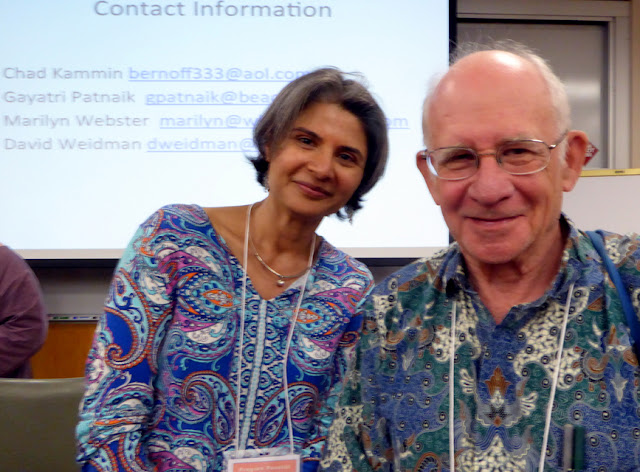This blog post started out as a simple email reply to some questions about Gita Mehta aka Gita Patnaik, and went on far too long. Only read what you wish. [NOTE: this was published on Sept. 20 2017. And updated on April 7 2022. Gayatri was just now named the new Director of the Beacon Press.]
Question 1. Have you read Gita's books?
If you want to know about
all of Gita’s writings, check out this link about her according to WorldCat
It
says she has "47 works in 296 publications in 15 languages and 5,485 library
holdings."
WorldCat has similar listings for all authors (for eg see Philip McEldowney Only 6 works http://www.worldcat.org/wcidentities/lccn-nr97024612)
I’ve
greatly enjoyed reading her fiction (Raj and River Sutra), but never have
gotten beyond the first few pages, for some reason, of her main non-fiction –
Karma Kola, Snakes and Ladders. We (the UVa library)
have those four books in our library, but not the coffee-table (non-academic) picture
book Eternal Ganesh.
Question 2. Are
“Sonny & Gita Mehta” listed in the credits of the “Vietnam” series
running on PBS currently (late September 2017).
Yes. They are one
listing out of about 600 at the end of each program. I saved the TV program
Monday night (18 September 2017) and went through the credits slowly.
Jack, they are about halfway through the
3 minutes of credits at the end of the program – about at 2 minutes, after the
main credits, the archives, the long list of music and songs, and under “Filmakers
would like to thank the following” and about half way through that second long
set of double column names, about half way through that, on the right.
Question 3. Why would they be listed in the credits? Gita's WorldCat listing does not include her films and perhaps one reason she’s listed in the credits – she evidently was a film director /
producer / writer of films in the late 1960s, early 1970s, even worked for NBC
some, and did some filming in 1970 in north Vietnam (I think). If you look at the nice “Study Guide for River
Sutra” at https://books.google.com/books?isbn=1410356841 it mentions Gita worked as a journalist in the 1970s and that “Mehta has written and filmed several television documentaries.” Her most popular documentary film is the hour-long “Dateline
Bangladesh” (1971) https://youtu.be/vFHlPID-eSk on the Bangladesh war and the creation of the country.
Question 4. Other links about Gita? I have some links to
Gita reviews and interviews at
http://www.people.virginia.edu/~pm9k/59/tales/tales.html#gita (update on April 7 2022, that website no longer exists)
But more than half of
the links (made around 2005) are dead, and also no longer work – very disappointing. Still
the ones that do work are interesting.
Question 5. Does the University of Virginia library have Knopf publications? specifically Bill Clinton's Knopf published book? Our University of Virginia library has over 10,000 books
published by Knopf, including 7 on Bill Clinton, 3 of which he has written,
especially his 2004 autobiography “My Life” at http://search.lib.virginia.edu/catalog/u4039027
Hard to keep up with
this couple, or Gita herself.
Question 6. Anything further about Gita or her family? Her brother, Naveen
Patnaik, is Chief Minister of the state of Orissa, and is always in the news.
His and Gita’s father, Biju Patnaik, was Chief Minister of Orissa twice, and he
was active in national and Orissa state politics from the 1940s until his death
in the 1990s, elected to the Lok Sabha (our congress), etc. Naveen’s older
brother is Prem Patnaik, who’s daughter, Gayatri Patnaik (’86) went to
Woodstock School and was on a panel at the recent Woodstock Reunion (2017) in Boston.
 |
| Gayatri Patnaik and Philip, after her panel at the Woodstock Reunion Boston 2017 August 5 |
Question 7. What more might you know about Gayatri? On p. 9 of the Woodstock
Reunion 2017 program there is a photo of Gayatri and a description -
“Gayatri Patnaik ’86 is
a Woodstock graduate, and her aunt, Gita Mehta (then Gita Patnaik), also
attended Woodstock School for some years. Gayatri has been in the publishing
industry for over 20 years and is currently editorial director of Beacon Press,
a distinguished book publisher that was founded in 1854 and has progressive
social justice ethos. Gayatri publishes books in US history and
race/ethnicity/immigration, and she began Beacon’s LGBTQ series, “Queer
Action/Queer ideas.” Her master’s is in cultural anthropology from The New
School of Social Research. She lives with her partner, Chris, and their irrepressible
five-year-old son, Matthew, in Arlington, MA.”
Beacon Press also has https://www.publishersweekly.com/pw/by-topic/industry-news/people/article/71770-meet-the-editor-gayatri-patnaik.html
Further questions?
Comments